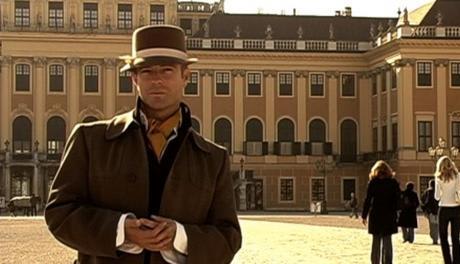Brian Pfeifle (now known as "Felix" Pfeifle after a legal name change) is, like many modern middle-class homosexuals, a rampant aesthete, typically dressed in vintage colonial attire when not gussying up in baroque garb without irony, ostensibly doing aristocratic drag performance in America without any real consciousness of the modern juxtaposition of political beliefs. As his more learned friends state, "he seems more interested in the visual," enjoying the projected fantasy of performative elitism as an arbitrary means to gain superiority, or define an identity, amidst the staggering pain of mediocrity.
These dramatic projections of self mixed with Pfeifle's own plight—his father suffers from Huntington's, which Brian has a 50% chance of developing—is where documentarian Christine Beebe found intrigue. In creating a series of computer animations about her subjects dreams, which often skew towards repressed self-awareness through metaphor—he's always revealed as a poseur amidst the elite—she attempts to draw a complex portrait of a man using artifice to mask the many anxieties and shortcomings in his own life.
As a narrative trajectory, Felix Austria! follows Pfeifle on a road trip of discovery looking for a man named Herbert Hinckle that corresponded with Otto von Habsburg, the last living heir to the Roman Empire, for years. This quest, while defined as a last ditch effort to make the most of life before the possible effects of a disease set in, is more of a projected reiteration of self-doubt; Felix wants to understand how some incidental man in middle-American maintained the interest of a member of a now defunct empire.
Unfortunately, most of the interviews and footage documenting this journey towards self-actualization is quite clumsy, often shot from the forehead down and edited together with little consciousness of the bigger themes. There's a meandering sensibility that often struggles to maintain the focus of subject deconstruction, using scenes of the stylish Pfeifle eating truck stop burritos to project his identity as one of deluded sustainment, avoiding his own potential illness and social limitations.
But because Brian never really admits to, or learns from, his own disposition, the trajectory is left mostly stagnant with very little action or change in perspective to drive a story forward. Beebe does her best to stylize her film to compensate for some of the shoddy footage and the overall lack of an intriguing subject but it's ultimately too little too late.
She even tries to inject some wry observations about financial irresponsibility and economic depression as a response to Pfeifle's limited understanding of the sorts of political ideologies present in his game of dress-up but even this eventual after-the-fact tag on of financial woes can't save what is in essence a very messy documentary.
(Belvedere Films)These dramatic projections of self mixed with Pfeifle's own plight—his father suffers from Huntington's, which Brian has a 50% chance of developing—is where documentarian Christine Beebe found intrigue. In creating a series of computer animations about her subjects dreams, which often skew towards repressed self-awareness through metaphor—he's always revealed as a poseur amidst the elite—she attempts to draw a complex portrait of a man using artifice to mask the many anxieties and shortcomings in his own life.
As a narrative trajectory, Felix Austria! follows Pfeifle on a road trip of discovery looking for a man named Herbert Hinckle that corresponded with Otto von Habsburg, the last living heir to the Roman Empire, for years. This quest, while defined as a last ditch effort to make the most of life before the possible effects of a disease set in, is more of a projected reiteration of self-doubt; Felix wants to understand how some incidental man in middle-American maintained the interest of a member of a now defunct empire.
Unfortunately, most of the interviews and footage documenting this journey towards self-actualization is quite clumsy, often shot from the forehead down and edited together with little consciousness of the bigger themes. There's a meandering sensibility that often struggles to maintain the focus of subject deconstruction, using scenes of the stylish Pfeifle eating truck stop burritos to project his identity as one of deluded sustainment, avoiding his own potential illness and social limitations.
But because Brian never really admits to, or learns from, his own disposition, the trajectory is left mostly stagnant with very little action or change in perspective to drive a story forward. Beebe does her best to stylize her film to compensate for some of the shoddy footage and the overall lack of an intriguing subject but it's ultimately too little too late.
She even tries to inject some wry observations about financial irresponsibility and economic depression as a response to Pfeifle's limited understanding of the sorts of political ideologies present in his game of dress-up but even this eventual after-the-fact tag on of financial woes can't save what is in essence a very messy documentary.
